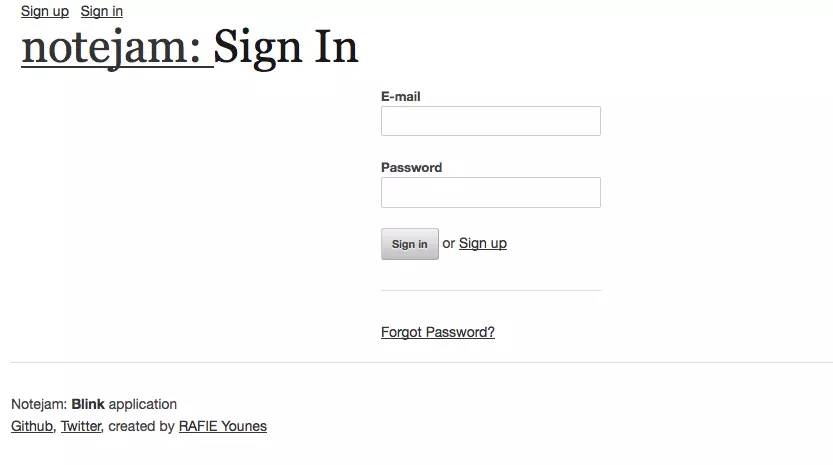Blink: A High-Performance PHP Framework
You've likely heard of Lumen, Silex, and Slim. Now, meet Blink, a new PHP framework designed for high-performance applications demanding significant server resources. This article explores Blink's capabilities and demonstrates its use through a sample "Notejam" application.

Blink leverages the Swoole PHP extension to achieve its performance goals. Let's dive into the details.
Key Features:
- Performance Optimization: Blink utilizes Swoole for enhanced performance, making it ideal for resource-intensive applications.
- Installation: Installation is via Composer. Note: The current Swoole version requires PHP 5 (not compatible with PHP 7).
- Flexibility: While lacking default templating and database management, Blink seamlessly integrates with popular choices like Twig and Eloquent.
- Notejam Application Example: This article guides you through building a Notejam app showcasing user authentication, session management, and CRUD operations for notes and pads.
- Resource Efficiency: The combined power of Blink and Swoole minimizes server load by keeping application resources active throughout the application's lifecycle.
- Community Driven: As a relatively new framework, Blink welcomes community contributions to documentation and feature development.
Swoole Extension Installation:
Blink's performance relies on the Swoole extension. This guide uses PEAR on Ubuntu 14.04 with a LAMP setup (using Vaprobash; see the project's Vagrantfile for details). (Note: Swoole's current incompatibility with PHP 7 is a factor in this setup choice.)
sudo apt-get update sudo apt-get install php-pear php5-dev libcurl3-openssl-dev sudo pecl install swoole
After installation, remember to add extension=swoole.so to your php.ini file. Verify the extension's loading with:
php -m | grep 'swoole'
(Current Swoole version: 1.7.22-alpha, incompatible with PHP 7; future versions aim to address this.)
Installing Blink:
Use Composer:
composer create-project --prefer-dist blink/seed
Start the server:
php blink server serve
Access the application at http://localhost:7788 (or adjust the port as described below).

Configuration:
While Blink doesn't offer command-line port specification, you can modify the port in src/config/server.php:
<?php return [
'class' => '\blink\server\SwServer',
'bootstrap' => require __DIR__ . '/../bootstrap.php',
'host' => '0.0.0.0',
'port' => 8080,
];
Remember to restart the server after making changes. The config directory also houses application and service configurations.
Building the Notejam App:
The Notejam app (available on Github) includes:
- Sign-in (with password reset)
- Sign-up
- Account settings (password change)
- Note and pad management
Integrating Twig (Templating Engine):
Blink doesn't include a default templating engine; we'll use Twig. Modify src/bootstrap.php and add src/bindings.php:
sudo apt-get update sudo apt-get install php-pear php5-dev libcurl3-openssl-dev sudo pecl install swoole
php -m | grep 'swoole'
Integrating Eloquent (Database Management):
For database interaction (users, notes, pads), we'll use Eloquent. Install via Composer:
composer create-project --prefer-dist blink/seed
Then, configure Eloquent in src/bindings.php:
php blink server serve
(Database migrations are handled via src/console/MigrateCommand.php and src/config/app.php.)
Routing, Controllers, and Views:
Routes are defined in src/http/routes.php. Controllers reside in src/http/controllers. Views use Twig templates. The article provides detailed examples of these components for the Notejam app's functionality (sign-up, sign-in, settings, note management). Middleware is used for authentication and authorization.
Sessions and Cookies:
Blink doesn't automatically handle PHP sessions; manual management (using the request object) is necessary.
Conclusion:
Blink, while still in early development, offers a compelling high-performance alternative. The community is encouraged to contribute to its growth and improvement.





The provided FAQs are already comprehensive and well-structured. No further modifications are needed.
The above is the detailed content of Can PHP Be Even Faster? Light-Speed with the Blink Framework. For more information, please follow other related articles on the PHP Chinese website!

Hot AI Tools

Undress AI Tool
Undress images for free

Undresser.AI Undress
AI-powered app for creating realistic nude photos

AI Clothes Remover
Online AI tool for removing clothes from photos.

Clothoff.io
AI clothes remover

Video Face Swap
Swap faces in any video effortlessly with our completely free AI face swap tool!

Hot Article

Hot Tools

Notepad++7.3.1
Easy-to-use and free code editor

SublimeText3 Chinese version
Chinese version, very easy to use

Zend Studio 13.0.1
Powerful PHP integrated development environment

Dreamweaver CS6
Visual web development tools

SublimeText3 Mac version
God-level code editing software (SublimeText3)

Hot Topics
 How to combine two php arrays unique values?
Jul 02, 2025 pm 05:18 PM
How to combine two php arrays unique values?
Jul 02, 2025 pm 05:18 PM
To merge two PHP arrays and keep unique values, there are two main methods. 1. For index arrays or only deduplication, use array_merge and array_unique combinations: first merge array_merge($array1,$array2) and then use array_unique() to deduplicate them to finally get a new array containing all unique values; 2. For associative arrays and want to retain key-value pairs in the first array, use the operator: $result=$array1 $array2, which will ensure that the keys in the first array will not be overwritten by the second array. These two methods are applicable to different scenarios, depending on whether the key name is retained or only the focus is on
 php regex for password strength
Jul 03, 2025 am 10:33 AM
php regex for password strength
Jul 03, 2025 am 10:33 AM
To determine the strength of the password, it is necessary to combine regular and logical processing. The basic requirements include: 1. The length is no less than 8 digits; 2. At least containing lowercase letters, uppercase letters, and numbers; 3. Special character restrictions can be added; in terms of advanced aspects, continuous duplication of characters and incremental/decreasing sequences need to be avoided, which requires PHP function detection; at the same time, blacklists should be introduced to filter common weak passwords such as password and 123456; finally it is recommended to combine the zxcvbn library to improve the evaluation accuracy.
 How to handle File Uploads securely in PHP?
Jul 08, 2025 am 02:37 AM
How to handle File Uploads securely in PHP?
Jul 08, 2025 am 02:37 AM
To safely handle PHP file uploads, you need to verify the source and type, control the file name and path, set server restrictions, and process media files twice. 1. Verify the upload source to prevent CSRF through token and detect the real MIME type through finfo_file using whitelist control; 2. Rename the file to a random string and determine the extension to store it in a non-Web directory according to the detection type; 3. PHP configuration limits the upload size and temporary directory Nginx/Apache prohibits access to the upload directory; 4. The GD library resaves the pictures to clear potential malicious data.
 PHP Variable Scope Explained
Jul 17, 2025 am 04:16 AM
PHP Variable Scope Explained
Jul 17, 2025 am 04:16 AM
Common problems and solutions for PHP variable scope include: 1. The global variable cannot be accessed within the function, and it needs to be passed in using the global keyword or parameter; 2. The static variable is declared with static, and it is only initialized once and the value is maintained between multiple calls; 3. Hyperglobal variables such as $_GET and $_POST can be used directly in any scope, but you need to pay attention to safe filtering; 4. Anonymous functions need to introduce parent scope variables through the use keyword, and when modifying external variables, you need to pass a reference. Mastering these rules can help avoid errors and improve code stability.
 Commenting Out Code in PHP
Jul 18, 2025 am 04:57 AM
Commenting Out Code in PHP
Jul 18, 2025 am 04:57 AM
There are three common methods for PHP comment code: 1. Use // or # to block one line of code, and it is recommended to use //; 2. Use /.../ to wrap code blocks with multiple lines, which cannot be nested but can be crossed; 3. Combination skills comments such as using /if(){}/ to control logic blocks, or to improve efficiency with editor shortcut keys, you should pay attention to closing symbols and avoid nesting when using them.
 Tips for Writing PHP Comments
Jul 18, 2025 am 04:51 AM
Tips for Writing PHP Comments
Jul 18, 2025 am 04:51 AM
The key to writing PHP comments is to clarify the purpose and specifications. Comments should explain "why" rather than "what was done", avoiding redundancy or too simplicity. 1. Use a unified format, such as docblock (/*/) for class and method descriptions to improve readability and tool compatibility; 2. Emphasize the reasons behind the logic, such as why JS jumps need to be output manually; 3. Add an overview description before complex code, describe the process in steps, and help understand the overall idea; 4. Use TODO and FIXME rationally to mark to-do items and problems to facilitate subsequent tracking and collaboration. Good annotations can reduce communication costs and improve code maintenance efficiency.
 How Do Generators Work in PHP?
Jul 11, 2025 am 03:12 AM
How Do Generators Work in PHP?
Jul 11, 2025 am 03:12 AM
AgeneratorinPHPisamemory-efficientwaytoiterateoverlargedatasetsbyyieldingvaluesoneatatimeinsteadofreturningthemallatonce.1.Generatorsusetheyieldkeywordtoproducevaluesondemand,reducingmemoryusage.2.Theyareusefulforhandlingbigloops,readinglargefiles,or
 How to create an array in php?
Jul 02, 2025 pm 05:01 PM
How to create an array in php?
Jul 02, 2025 pm 05:01 PM
There are two ways to create an array in PHP: use the array() function or use brackets []. 1. Using the array() function is a traditional way, with good compatibility. Define index arrays such as $fruits=array("apple","banana","orange"), and associative arrays such as $user=array("name"=>"John","age"=>25); 2. Using [] is a simpler way to support since PHP5.4, such as $color






